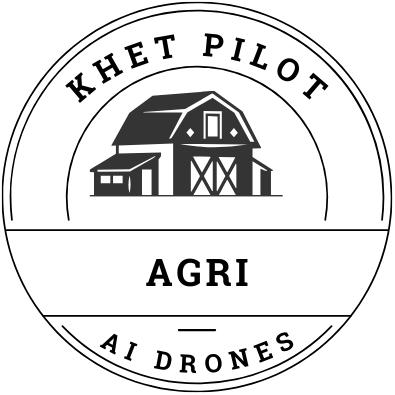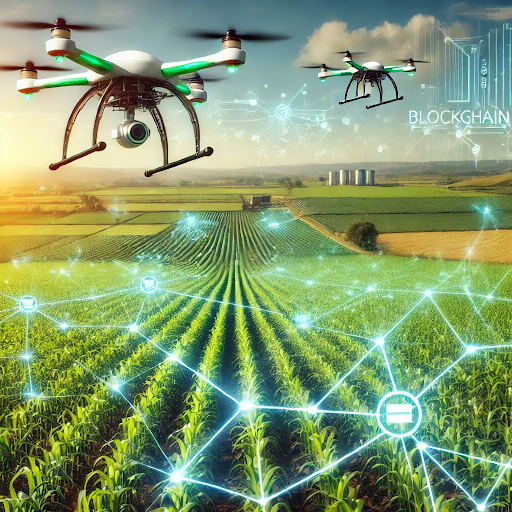Consumers these days are very conscious regarding the sources of their foods. This includes questions like: ‘How was it cultivated?’ ‘Who worked with it?’ ‘What was used for its farming?’ This quest for accuracy and thoroughness has seen the agriculture industry adopt hi-tech equipment such as agri drones and technology such as blockchain. Both of these are revolutionizing the agricultural practices and enhancing the efficiency and openness of supply chains.
In this blog, we will explore how agri drones and blockchain technology aid in transforming the supply chains for both farmers and consumers.
The Role of Agri Drones in Modern Agriculture
Agri drones are among the most useful innovation in farming. They can effectively survey crops, provide high-resolution images, undertake complete computerized analysis on crop health, or prescriptively spray fertilizers and pesticides.
As a result, these drones are already at the frontiers of agri development in India to furnish farmers with optimum outputs. In virtually no time—the time it takes to watch a movie—drones can cover the field area. They can identify problem areas related to water stress, insect attacks, and uneven crop growth. The data gathered can provide farmers with the right methodologies. This will ensure both quality and quantity at the end of the process.
Agri drones can benefit far beyond the farm gate. In addition, in collaboration with blockchain technology, these agri drones contribute toward a transparent and traceable supply chain that clients can trust.
What is Blockchain Technology?
Blockchain is a distributed digital ledger that keeps recording transactions across multiple computers. It ensures tamper-proofing of recorded transactions. Blockchain data cannot be changed, ensuring the recorded information remains correct and undisturbed. It is because of this that blockchain might be one of the efficient traceability methods in a supply chain; this is so because traceability of products from the origin and all movements is key.
The blockchain will record and ensure safe storage of the processes involved in agricultural production. It will track everything from planting to harvesting, packaging, and delivery. This will ensure accountability elicit encouraging satisfaction to the buyer on which he purchases.
How the Agri Drones and the Blockchain Technology Compliment Each Other?
When combined with drone agro-technologies, blockchain achieves complete traceability in this field. This explains how these two contribute to supply chain management by creating transparency:
Data collection using Agri Drones: Drones gather important information on the crop such as health status, pesticides as well as irrigation and harvesting schedule. The data is highly accurate and recorded in real-time, providing a clear picture of crop management.
Blockchain for Real-Time Logging of Data from Agri Drones: Once the agri drones have accessed the data, it can be logged onto a blockchain system. Consequently, this creates a real-time record of the development processes and methods applied to the crops. The record is secure and immutable. Every data point, from the moment the field is sprayed with pesticides to harvest time, is stored in a blockchain ledger.
Transparency in Supply Chain: Blockchain Technology documents every step in the supply chain-from a field to a processing plant or from that place to a retailer-completely transparent on the supply chain. As a result, consumers can scan the packaging and its respective QR code to see where their food came from and how it was produced.
The below table, based on a recent research study, analyzes the potential of an IoT blockchain technology for drone-based autonomous operation. The application is vast and promising in the smart farming sector.
Study: Blockchain Technology in Drone Operations for Smart Farming
This table is based on a research that recently looked into the many uses of the blockchain-powered IoT platform for the autonomous operation of drones and how one can transform smart farming.
| Aspect | Description | Insights/Statistics |
| Transaction Speed | Blockchain technology supports quicker and efficient transactions between farmers, suppliers, and buyers. Network congestion may impact the speeds. | Average transaction time: 15 seconds |
| Transaction Cost | Supports cheaper payment options than traditional systems. The implementation cost, however, is very high. | Average transaction fee: $0.50 |
| Transparency | Blockchain Technology will ensure that all stages are tracked, hence bringing in transparency between farmers, buyers, and consumers. | Blockchain adoption rate in supply chains: 75% |
| Traceability | Agri drones with blockchain enable the detection, from sowing to the delivery stage, with crop data gathered for quality assurance and research. | Percentage of crops tracked: 50% |
| Security | Its tamper-proof ledger, along with drone surveillance, increases security against fraud and data breaches. | Reported data breaches: 0 |
| Efficiency | All forms of integration between blockchain technology and agricultural drones eliminate middlemen. They also automatically process certain operations. This leads to better efficiency in the operation. | Reduction in transaction costs: 20% |
| Adoption Challenges | Awareness campaigns for blockchain and drone application to stakeholders for the use in awareness on the benefits of the approach. | Farmers in blockchain pilot programs: [Data Missing] |
FAQs
How does agri drones promote transparency in the supply chain?
These drones log data on blockchain systems, detailing crop health and growth. Hence, every step from planting to harvest and distribution in the supply chain will be traceable.
How safe is blockchain technology for traceability?
This implies that blockchain is extremely secure. Its operations spread across multiple points. Once the system writes the data, it cannot change or alter it. As a result, this prevents any manipulation of information, ensuring its integrity. Therefore, you can use blockchain to trace food supply chains where full transparency is paramount.
What can the consumer gain through this blockchain technology?
They will see a QR code on the product. As a result, this allows them to easily access information about how their food was grown, handled, and transported. Consequently, this builds trust. Consumers can verify the genuineness of the products. They can also confirm the sustainability of the farming practices followed.
Conclusion
The integration of agriculture drones with blockchain technology is transforming the agricultural supply chain. It enhances traceability and transparency like never before. Agri drones help farmers manage their crops with care. Blockchain technology permanently records every action during the process.
These two technologies are paving the way for a future where consumers can trust the source and safety of their food. Meanwhile, farmers will be able to operate in a more transparent and efficient manner.

